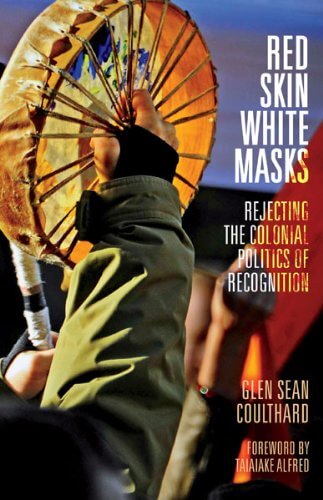
Part of the history of the last five centuries on these territories is the story of Europeans displacing Indigenous peoples for economic gain. It is this history that Glen Coulthard, in his new book, Red Skin, White Masks: Rejecting the Colonial Politics of Recognition, calls the “violent transformation of noncapitalist forms of life into capitalist ones.” This form of primitive accumulation, through violent dispossession, has since given way to quieter, less visible, structures of constant displacement. In the pointed words of Patrick Wolfe, cited by Coulthard, “settler colonizers come to stay: invasion is a structure not an event.”
According to Coulthard, a professor at UBC’s First Nations Studies Program active in local struggles, the structure of invasion continues to dispossess Indigenous peoples through the disingenuous politics of recognition — which includes the transfer of land, the delegation of self-determination and economic development initiatives from the state to Indigenous communities. Despite appearances, Coulthard argues that these measures do little more than reproduce the systems of power they claim to uproot. “[I]n the Canadian context, colonial relations of power are no longer reproduced primarily through overtly coercive means,” Coulthard writes, “but rather through the asymmetrical exchange of mediated forms of state recognition and accommodation.”
Taiaiake Alfred, who wrote the forward to Coulthard’s book, stated in Wasáse: Indigenous Pathways of Action and Freedom that “we are negotiating with our oppressor from a position of weakness.” Coulthard argues that as long as recognition is something given to oppressed peoples by a dominant body, it will inevitably fail in its stated purpose to liberate those people. This happens in part because it entrenches “the assumption that the flourishing of Indigenous peoples as distinct and self-determining entities is significantly dependent on their being afforded cultural recognition and institutional accommodation by the settler state apparatus.”
Furthermore, Canada’s practice of recognition and accommodation has typically occurred in ways which leave the underlying economic system unchallenged. In writing about his own people, the Dene Nation, Coulthard details the way governments worked to separate the recognition of cultural practices “from any socioeconomic scheme that might potentially disrupt the further accumulation of capital through the development of the North’s resource base.”
Accommodation of cultural differences, and even transfers of land, could be accepted by the state, so long as the power relationship remains intact and the capitalist system animating it remains unquestioned. Consequently, according to Coulthard, accepting these offers of recognition has only meant “the continued dispossession of our homelands.”
Alfred, also in Wasáse, likewise laments the way self-government for state-created Indigenous governments within the larger colonial system have nonetheless perpetuated capitalism by integrating them into the resource-exploitation economy. “[S]elf-government and economic development,” he writes, “signify the defeat of our peoples’ struggles just as surely as, to our grandparents, residential schools, land dispossession, and police beatings signified the supposed supremacy of white power and the subjugation and humiliation of the first and real peoples of this land.”
Coulthard also critiques the politics of reconciliation. Vancouver recently completed its Year of Reconciliation, which culminated in the city declaring that we are on unceded Indigenous territories. Though his book does not mention this recent development, Coulthard criticizes such reconciliation efforts for leaving structural conditions intact. According to him, they depend on the false notion that colonialism is an artifact of the regrettable past, and that the only change required is a narrowly symbolic shift. It achieves this by creating a situation where colonized people develop what Fanon called “psycho-affective” attachments to these symbols of reconciliation. Once co-opted through this process of internalization — believing that symbolic reconciliation amounts to liberation — “government need not undertake actions required to transform the current institutional and social relationships.”
When people recognize these diversions and sleight of hands, and consequently reject the politics of recognition and reconciliation, they are disdainfully described as being unable to “move on.” But Coulthard sees it differently. Anger at the persistence of colonialism is understandable, since it is “directed at a structural and symbolic violence that still structures our lives, our relations with others, and our relationships with land.” It also symbolizes a critical awareness that is necessary for revolutionary change.
Colonizers understand that this anger represents insight, and, with insight, a potential call to arms. “Peoples subjected to colonization and white supremacy cannot be outraged,” writes Andrea Smith, “because outrage would indicate they are no longer willing to accept these conditions.” It’s for this reason that the anger of oppressed people is so consistently disparaged and policed. Coulthard sees this anger as transformative — as the animator of an Indigenous resurgence. Not only can this critical awareness help dismantle the colonial structure, it can also be a necessary part of building an alternative. “I am not so concerned with how we dismantle the master’s house,” writes Leanne Simpson in Dancing on Our Turtle’s Back. “[B]ut I am very concerned with how we (re)build our own house, or our own houses.”
Coulthard closes his book with a meditation on what an Indigenous resurgence can look like. It’s a vision of communities deeply rooted to the land, organized around the ethic of mutual aid, and unencumbered by the urge towards hierarchies. It’s also an explicitly anti-capitalist one. “For Indigenous nations to live,” Coulthard says conclusively, “capitalism must die. And for capitalism to die, we must actively participate in the construction of Indigenous alternatives to it.”

Indigenous Peoples are putting their bodies on the line and it's our responsibility to make sure you know why. That takes time, expertise and resources - and we're up against a constant tide of misinformation and distorted coverage. By supporting IC you're empowering the kind of journalism we need, at the moment we need it most.